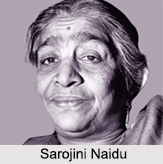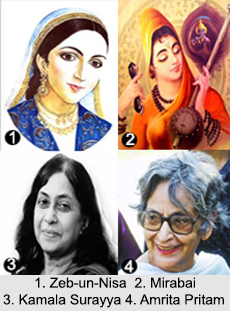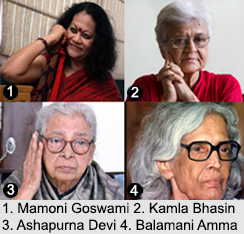 Female Poets in India broke the form and raged a path, leaving a permanent mark on Indian literature. Since earlier time, India has been a dissolving pot of creative people like writers, poets, artists, sculptors, musicians, etc., who have formed our history and culture. Many diverse Indian women poets are probing the role of form in existing poetry.
Female Poets in India broke the form and raged a path, leaving a permanent mark on Indian literature. Since earlier time, India has been a dissolving pot of creative people like writers, poets, artists, sculptors, musicians, etc., who have formed our history and culture. Many diverse Indian women poets are probing the role of form in existing poetry.
Popular Female Poets in India
Female Poets in India left an indelible mark on literature in general and Indian literature in particular. Following are the popular Female Poets in India:
Sarojini Naidu: Sarojini Naidu is known as the "nightingale of India." She began to write poetry at the age of 12, and her first collection of poems is "The Golden Threshold". She was a part of India"s freedom fight and a foremost figure in the Quit India Movement.
Zeb-un-Nisa: Princess Zeb-un-Nisa is known as the “Ornament of Womankindâ€. She was the eldest child of Emperor Aurangzeb and Princess Dilras Banu Begum. She began writing poetry at the age of 14 choosing her pen name as "Makhfi", or The Hidden One. She wrote a collection of poetry called "Diwan" which contains 5,000 verses, and also wrote three other books of poetry as well as 15,000 verses.
Kamala Surayya: Kamala Das or Kamala Surayya is known as "the mother of modern English Indian poetry". She began writing poetry as a kid. She wrote numerous short stories and poems. Her first book of poetry was the "Summer in Calcutta". She was often compared to Marguerite Duras and Sylvia Plath. Kamala Surayya was shortlisted for the Nobel Prize for Literature in 1984 and was awarded with the Sahitya Akademi Award in 1985.
Toru Dutt: She is frequently referred to as the Keats of Indo-English literature. Her works include "Le Journal de Mademoiselle d"Arvers", the first novel to be written in French by an Indian writer, and another novel, "Bianca" stayed incomplete. Her poetry collection "A Sheaf Gleaned in French Fields" was published in 1876, and "Ancient Ballads" and "Legends of Hindustan" was published in 1882.
Amrita Pritam: She was intensely influenced by India"s freedom struggle. She was the first Punjabi woman poet, novelist and essayist, and wrote in both Punjabi and Hindi. Her career spanned six decades and she wrote over 100 books of poetry, fiction, essays, biographies, anthologies and an autobiography. Her work has been translated into a number of languages around the world. She was the first woman to win the Sahitya Akademi Award for her magnum opus, a long poem entitled "Sunehade" (Messages).
 Mahadevi Varma: Mahadevi Varma was one of India"s most prolific women poets, freedom-fighters, educationists and activists. She was one of four founders of the "Chhayavaad" movement, a different wave of romanticism in Hindi poetry. She was the first woman to be granted India"s highest literary award for lifetime achievement, the Sahitya Akademi Fellowship, in 1979. She was also honoured with the Padma Bhushan in 1956.
Mahadevi Varma: Mahadevi Varma was one of India"s most prolific women poets, freedom-fighters, educationists and activists. She was one of four founders of the "Chhayavaad" movement, a different wave of romanticism in Hindi poetry. She was the first woman to be granted India"s highest literary award for lifetime achievement, the Sahitya Akademi Fellowship, in 1979. She was also honoured with the Padma Bhushan in 1956.
Subhadra Kumari Chauhan: She is perhaps the best known exponent of the "Veer Ras" sub genre. Mainly writing on themes of patriotism and nationalism, her most famous verses include "Jhansi ki Rani" and "Veeron Ka Kaisa Ho Basant".
Balamani Amma: Balamani Amma wrote in Malayalam and was known as the "poetess of motherhood." She was the receiver of a number of celebrated awards and recognitions inclusive of the Sahitya Akademi Fellowship. Some of her famous works are "Amma", "Muthassi" and "Mazhuvinte Katha".
Mirabai: She was a 16th-century Hindu spiritualist poet and follower of Krishna. She is a celebrated "Bhakti" saint, particularly in the North Indian Hindu tradition. Her poems are lyrical "padas". There are no existing manuscripts of her poetry from her century. The largest collection of poems credited to her are in 19th-century manuscripts. Her method combines emotional mood, boldness, desire, hope, joy and happiness of union, always centred on Krishna.
Eunice de Souza: She was an Indian English language poet, literary critic and novelist. Among her famous books of poetry is "Women in Dutch painting" (1988). "Ways of Belonging" and "Selected and New Poems" are some of her famous works.
Akka Mahadevi: She was one of the early female poets of the Kannada language and a famous personality in the "Veerashaiva Bhakti" movement of the 12th century. Her 430 existing "Vachana" poems and the two short writings called "Mantrogopya" and the "Yogangatrividhi" are considered her most remarkable part to Kannada literature.
 Lalleshwari: She is locally known as Lal Ded. She was an originator of the spiritualist poetry called "vatsun" or "vakhs", literally meaning "speech". Her verses are the earliest compositions in the Kashmiri language and are an imperative part in history of contemporary Kashmiri literature.
Lalleshwari: She is locally known as Lal Ded. She was an originator of the spiritualist poetry called "vatsun" or "vakhs", literally meaning "speech". Her verses are the earliest compositions in the Kashmiri language and are an imperative part in history of contemporary Kashmiri literature.
Kamini Roy: She was a leading Bengali poet, social worker and feminist in British India. She was the first woman honours graduate in British India. She published her first collection of verses "Alo Chhaya" in 1889. Amongst her famous literary contributions were –"Mahasweta", "Pundorik", "Pouraniki", "Dwip O Dhup", "Jibon Pathey", "Nirmalya", "Malya O Nirmalya", and "Ashok Sangeet". She wrote "Gunjan" for children and a book of essays "Balika Sikkhar Adarsha".
Ashapurna Devi: She was a famous Bengali novelist and poet. She was awarded with Jnanpith Award and the Padma Shri by the Government of India. Her novel "Baluchori" was adapted as a Television serial in Deepto, named Aparajita. Her magnum composition, the "trilogy Pratham Pratishruti" (1964), "Subarnolata" (1967) and "Bakul Katha" (1974), symbolises a continual struggle for women to attain equal rights.
Mamoni Raisom Goswami: Indira Goswami is known by her pen name Mamoni Raisom Goswami. She was an Assamese editor, poet, professor, scholar and writer. She was the winner of the Sahitya Akademi Award, the Jnanpith Award, and Principal Prince Claus Laureate. Countless of her works have been translated into English from her local Assamese which include "The Moth Eaten Howdah of the Tusker", "Pages Stained With Blood" and "The Man from Chinnamasta".
Sugathakumari: She is an Indian poet and activist. She has won numerous awards and recognitions including Kerala Sahitya Akademi Award. She was honoured with Padma Shri. "Mutthuchippi", "Devadasi", "Kurinjippookkal†are some of her works.
Shanta Janardan Shelke: She was a Marathi poet and writer of Marathi language. Her work included song compositions, stories, translations and literature for children. She led over many literary gatherings. Her pen name is Vasant Avsare. Some of her compositions became eternal in the form of songs sung by Marathi greats like Lata Mangeshkar, Asha Bhosale and Kishori Amonkar, to name a few.
Kamla Bhasin: She is an Indian developmental feminist activist, poet, author and social scientist. She is best known for her poem "Kyunki main ladki hoon", "mujhe padhna hai".
Nalini Bala Devi: She was a noted Indian writer and poet of Assamese literature, known for nationalistic as well as spiritual poetry. She was awarded with the Padma Shri. She is famous for her poetry collection "Alakananda".
Female poets in India in multiple ways shaped the field of Indian poetry establishing the relatively curious and contested surroundings of Women poets in India.













